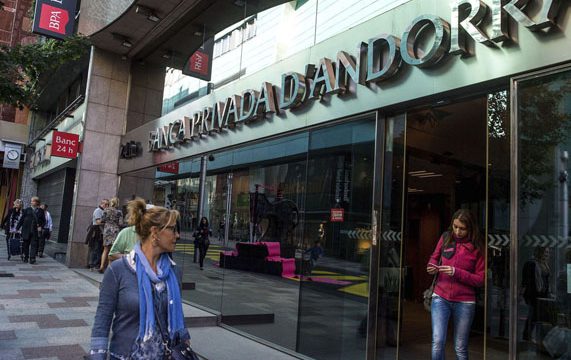(Bloomberg) — Juan Ovelar made a quick decision when he heard the U.S. government had accused his Andorran bank of money-laundering, and immediately withdrew most of his funds.
“I’m worried that everyone will do the same as I did and there will be a knock-on effect that could affect other banks,” said Ovelar, 27, a computer expert from Argentina, in an interview outside the headquarters of Banca Privada d’Andorra in the capital Andorra La Vella.
The U.S. Treasury named Banca Privada d’Andorra, the country’s fourth-largest bank, a “primary money-laundering concern” on March 10. That led to its seizure by Andorran authorities, the arrest of the chief executive officer and a run on customer funds at the lender’s Spanish unit.
The bank’s fate sent tremors through Andorra, a 181-square-mile (469 square-kilometer) Catalan-speaking microstate in the eastern Pyrenees with an economy based on skiing, tax-free shopping and banking. The scandal raises risks for its financial industry, which makes up almost a fifth of the 1.8 billion-euro ($2 billion) economy and is too big to be bailed out by the state, said Xavier Puig, a professor at Barcelona’s Universidad Pompeu Fabra.
Customers lined up at the bank’s branches to take out their money after it limited cash withdrawals to 2,500 euros a week, starting March 16. The bank’s new management, appointed by local regulators, imposed the limit after international banks severed credit lines, a person with knowledge of the situation said.
Halting ‘Gangrene’
Andorra’s government is trying to convince international banks to open credit lines so customers won’t be cut off from funds, said the person, who asked not to be identified because the talks are private. Options under consideration for the bank include the sale of assets or liquidation, the person said, adding that officials are seeking a quick solution to limit the effect on other banks.
“The government is acting quickly to find a solution because the consequences can be very serious,” said Puig. “They need to amputate this part so that the gangrene doesn’t extend to the rest of the body.”
Fitch Ratings put the three largest Andorran banks on watch for a possible downgrade on Monday because of “potential spill-over effects.” The lenders, Credit Andorra SA, Andbank and Mora Banc Grup SA, all currently carry an A- long-term issuer default rating from Fitch.
“Despite a swift and strong response to BPA’s crisis by all parties involved, the reputation of the system and therefore the banks’ franchises may be damaged, potentially affecting growth prospects and the stability of their businesses models,” Fitch said in a report.
Too Small
The U.S. Treasury accused Banca Privada d’Andorra of laundering funds for criminal groups in Russia and China and corrupt officials in Venezuela, and said high-level management helped arrange the transactions.
Andorra’s banks had assets of 15.8 billion euros in 2013, according to the country’s banking association, making it several times the size of the economy. The industry employs about 2,500 people out of a population of some 70,500.
“The main risk right now is a contagion risk to the rest of us, but I don’t think that is going to happen,” said Pedro Gonzalez, the CEO of MoraBanc, in an interview. “The markets are being mature enough and are discriminating between a bank where there have allegedly been bad practices and the rest.”
MoraBanc is operating normally and all lines with counterparties are open, Gonzalez said. Officials at Credit Andorra and Andbank declined to comment.
Run at Unit
The tiny nation, perched on the mountainous border between France and Spain, had a 400 million-euro budget in 2014, too small to absorb a public bailout of the bank, Puig said.
A fraction of the size of Rhode Island, the smallest U.S. state, Andorra uses the euro as its currency even though it isn’t part of the European Union. It has no central bank. Independent since 1278, it’s officially co-led by the president of France and a Spanish Catholic bishop.
Banca Privada d’Andorra, founded in 1962, has 1.79 billion euros of assets, according to the U.S Treasury statement.
Ripples from the bank’s troubles are spreading beyond Andorra. Its Banco de Madrid SA unit stopped operations on March 16 after a run on customer funds, and is seeking protection from creditors, the Bank of Spain said. Client deposits of up to 100,000 euros are backed by Spain’s deposit-guarantee fund, the central bank said.
Standard and Poor’s cut Andorra’s debt rating to BBB from BBB+ on March 12, saying that risks stemming from the banking industry “have increased beyond our expectations.”
Spanish Expansion
Andorra has historically relied on banking secrecy to lure international deposits. In 2009, it started to adopt the standards of the Organization for Economic Cooperation and Development and has signed agreements for the exchange of tax information with countries including Spain.
In the last four years, Andorran banks have looked abroad, especially to Spain. MoraBanc announced an agreement in January to buy a majority stake in Spanish advisory firm Tressis, while Credit Andorra bought Banco Alcala SA in 2011, the same year BPA purchased Banco de Madrid.
Artículo publicado en Bloomberg






Escribir comentario